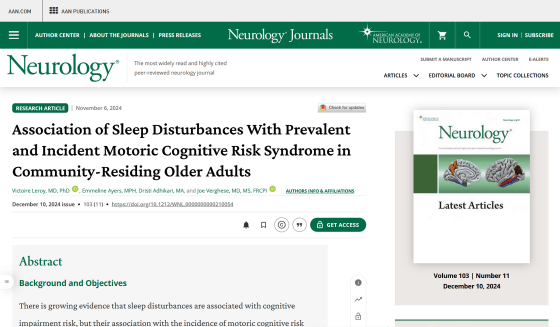People who feel excessive sleepiness or lack of motivation to be active during the day may be at risk of dementia

A new study conducted by researchers at
Association of Sleep Disturbances With Prevalent and Incident Motoric Cognitive Risk Syndrome in Community-Residing Older Adults | Neurology
https://www.neurology.org/doi/10.1212/WNL.0000000000210054

American Academy of Neurology: Neurology Resources | AAN
https://www.aan.com/PressRoom/Home/PressRelease/5211
Extra Sleepiness During The Day Could Be a Signal of Pre-Dementia : ScienceAlert
https://www.sciencealert.com/extra-sleepiness-during-the-day-could-be-a-signal-of-pre-dementia
MCR is a syndrome characterized by a slowing of gait speed and mild cognitive impairment, and is said to be a precursor to dementia. The research team recruited 445 subjects aged 65 years or older without dementia to investigate the relationship between daytime sleepiness and motivation to be active and MCR.
The subjects, whose average age was 76, filled out a sleep questionnaire at the start of the study. The questions asked included whether they woke up during the night, whether they tried to fall asleep within 30 minutes, how often they had trouble sleeping when it was too hot or too cold, and whether they took any medication to help them sleep. To assess daytime sleepiness, participants were asked if they had trouble staying awake while driving, eating, or engaging in other social activities, and were also asked about their motivation to do activities.
The subjects' motor function was assessed by their walking speed on a treadmill, and tests were conducted once a year from the start of the study. The subjects were followed for an average of three years, and 177 of the subjects were classified as 'poor sleepers' and 268 as 'good sleepers.'

The analysis showed that 35.5% of participants with excessive daytime sleepiness and lack of motivation developed MCR, compared with only 6.7% of those without. Even after controlling for factors such as age, depression, and other health conditions, participants with excessive daytime sleepiness and lack of motivation were more than three times as likely to develop MCR.
In the graph below, the solid line is 'Good sleepers' and the dashed line is 'Poor sleepers', the vertical axis shows the percentage of people who did not develop MCR, and the horizontal axis shows the number of days since the start of the study. It can be seen that people who slept well had a lower incidence of MCR. The reason why the graph fluctuates more to the right is because the number of subjects being followed decreases as the number of days passes.

'Our findings highlight the need to screen for sleep problems,' said lead author Dr Victor Leroy from the Albert Einstein College of Medicine. 'If people seek help for sleep problems, it may be possible to prevent cognitive decline later in life.'
However, further research is needed to explore the relationship between sleep problems and cognitive decline, as well as the role that MCR plays in the development of dementia.
Related Posts:
in Science, Posted by log1h_ik







